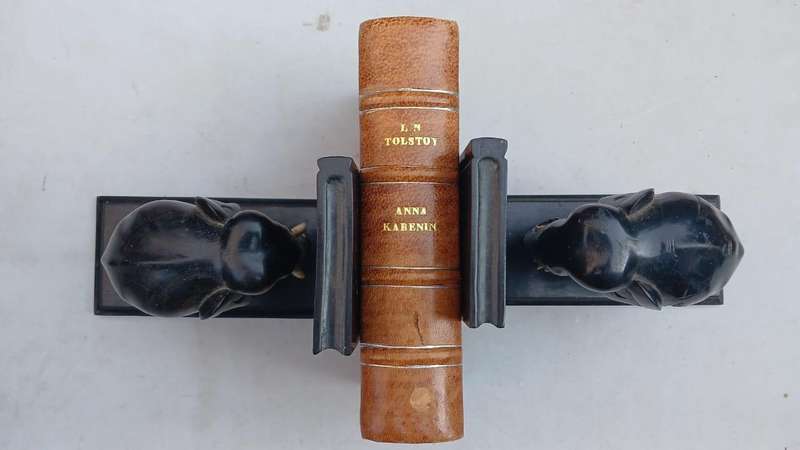
Anna Karenina by Tolstoy ( exquisite leather binding)
Check my rate
| Main centres: | 1-3 business days |
| Regional areas: | 3-4 business days |
| Remote areas: | 3-5 business days |

| Main centres: | 1-3 business days |
| Regional areas: | 3-4 business days |
| Remote areas: | 3-5 business days |
Anna Karenina is a novel by the Russian author Leo Tolstoy, first published in book form in 1878. Tolstoy called it his first true novel. It was initially released in serial installments from 1875 to 1877, all but the last part appearing in the periodical The Russian Messenger. By the time he was finishing up the last installments, Tolstoy was in an anguished state of mind and, having come to hate it, finished it unwillingly.
The novel deals with themes of betrayal, faith, family, marriage, Imperial Russian society, desire, and the differences between rural and urban life. The story centres on an extramarital affair between Anna and cavalry officer Count Alexei Kirillovich Vronsky that scandalises the social circles of Saint Petersburg and forces the young lovers to flee to Italy in a search for happiness, but after they return to Russia, their livesfurther unravel.
Trains are a motif throughout the novel, with several major plot points taking place either on passenger trains or at stations in Saint Petersburg or elsewhere in Russia. The story takes place against the backdrop of the liberal reforms initiated by Emperor Alexander II of Russia and the rapid societal transformations that followed. The novel has been adapted into various media including theatre, opera, film, television, ballet, figure skating, and radio drama.
Count Lev Tolstoy( 1828 1910), usually referred to as Leo Tolstoy, was a Russian writer. He is regarded as one of the greatest and most influential authors of all time.
Born to an aristocratic family, Tolstoy achieved acclaim in his twenties with his semi-autobiographical trilogy, Childhood, Boyhood and Youth (18521856), and with Sevastopol Sketches (1855), based on his experiences in the Crimean War. His War and Peace (1869), Anna Karenina (1878), and Resurrection (1899), which is based on his youthful sins,[5] are often cited as pinnacles of realist fiction and three of the greatest novels ever written. His oeuvre includes short stories such as "Alyosha the Pot" (1911) and "After the Ball" (1911) and novellas such as Family Happiness (1859), The Death of Ivan Ilyich (1886), The Kreutzer Sonata (1889), The Devil (1911), and Hadji Murat (1912). He also wrote plays and essays concerning philosophical, moral and religious themes.
In the 1870s, Tolstoy experienced a profound moral crisis, followed by what he regarded as an equally profound spiritual awakening, as outlined in his non-fiction work Confession (1882). His literal interpretation of the ethical teachings of Jesus, centering on the Sermon on the Mount, caused him to become a fervent Christian anarchist and pacifist. His ideas on nonviolent resistance, expressed in such works as The Kingdom of God Is Within You (1894), had a profound impact on such pivotal 20th-century figures as Mahatma Gandhi, Martin Luther King Jr. James Bevel, and Ludwig Wittgenstein. He also became a dedicated advocate of Georgism, the economic philosophy of Henry George, which he incorporated into his writing, particularly in his novel Resurrection (1899).
Tolstoy received praise from countless authors and critics, both during his lifetime and after. Virginia Woolf called Tolstoy "the greatest of all novelists", and Gary Saul Morson referred to War and Peace as the greatest of all novels. He received nominations for the Nobel Prize in Literature every year from 1902 to 1906 and for the Nobel Peace Prize in 1901, 1902, and 1909. Tolstoy never being awarded a Nobel Prize remains a major Nobel Prize controversy.
THE SPECIAL CUSTOM BINDING IS IN FULL LEATHER (VERY SMOOTH) WITH RIBBED SPINE AND GILT LETTERING. MARBLE ENDPAPERS. A LOVELY BOOK.